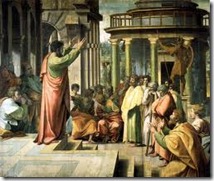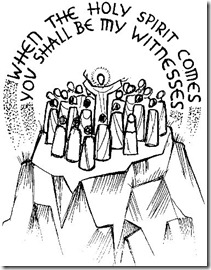In the last post we began to look at how Jesus, before his ascension, prepared the disciples for the task of taking the gospel “to the end of the earth.” He offered them, many convincing proofs that he was alive.” (Acts 1:3); He opened their minds to understand Scripture, giving them a biblical theology; He promised to send the Holy Spirit, giving them a spiritual dimension. To continue:
Jesus gave them authority to speak about all they had seen and heard him do. Here we have apostolic authority and an evangelistic programme. Our remit is to faithfully pass on the account of what the apostles saw and testified to. These are the people who can declare down through history,
“That which was from the beginning, which we have heard, which we have seen with our eyes, which we have looked upon and have touched with our hands, concerning the word of life...that which we have seen and heard we proclaim also to you.” (1 John 1:1-3)
These men are described in Acts 4 when they are brought before the Jewish authorities to account for having healed a beggar and preached Christ. “By what power or in what name did you do this?” they are asked. Peter replied, “It is in the name of Jesus Christ of Nazareth, whom you crucified but whom God raised from the dead, that this man stands before you healed.”
The Bible then says, “When they saw the courage of Peter and John and realised that they were unschooled, ordinary men, they were astonished and they took note that these men had been with Jesus.” (4:13)
 We are not free to make the message in the image of our own impressions no matter how much cleverer, better educated we think we are, or how well developed our theology. There is no “that was then, this is now” dynamic in this story. What they saw and heard, what they testified to, we are charged to faithfully pass on. The writer of Hebrews wrote:
We are not free to make the message in the image of our own impressions no matter how much cleverer, better educated we think we are, or how well developed our theology. There is no “that was then, this is now” dynamic in this story. What they saw and heard, what they testified to, we are charged to faithfully pass on. The writer of Hebrews wrote:
We must pay more careful attention, therefore, to what we have heard, so that we do not drift away. For if the message spoken by angels was binding, and every violation and disobedience received its punishment, how shall we escape if we ignore such a great salvation?
This salvation which was first announced by the Lord, was confirmed to us by those who heard him. God also testified to it by signs, wonders and various miracles, and gifts of the Holy Spirit distributed according to his will. (Heb.2:1-4)
5. They had been with Jesus and he had shown them his glory.
Having prepared them, taught them, empowered and commissioned them, Jesus showed them his glory. He was taken up from them and, we are told, a cloud took him out of their sight. But this was no ordinary cloud, no cumulus from the weather map, but a cloud of glory. The important thing about the ascension story is not the question of whether heaven is somehow “up there,” but about the fact that Jesus returned to his former glory, God left the scene in physical form and was to come to believers in spiritual form. Finally, we are told:
“They were looking intently up into the sky as he was going, when suddenly two men dressed in white stood beside them. 'Men of Galilee,; they said, 'why do you stand there looking into the sky? This same Jesus, who has been taken from you into heaven, will come back in the same way you saw him go into heaven.” (Acts 1:10-11)
It is possible to be too earthly minded to be any heavenly good, but we can also be too heavenly minded to be any earthly good. While there is nothing wrong with the prayer, “Come, Lord Jesus!” nevertheless we must be about the business before us. Some ask why it is we don’t have continuous mountain top experiences. It is because the work is in the valley and, like the disciples, we must return from the mountain top of whatever special experience God has been pleased to give us and get on with things, find a gospel focus. We can find that focus if we get these things into historical context:
-
Jesus returned to heaven (Ascension)
-
The Holy Spirit came (Pentecost)
-
The Church goes out to witness (Mission)
- Jesus will come back (Parousia)
We are in the mission phase of God’s great plan for the redemption of creation and mission and discipleship is our focus until king Jesus comes to sum up the whole cosmos in himself. When the disciples returned from the Mount of Olives we are told, “They all joined together constantly in prayer...” We do not worship the book, nor do we adhere to the dead accounts of past events, but we treasure the account preserved for us and faithfully transmitted to our time. It is our task to prayerfully and faithfully pass it on until he comes.
Previously: To the End of the Earth – Ascension




